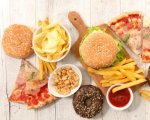Emotional Eating

Emotional eating can be defined as the action of eating large amounts of food even when you are not hungry. Often in response to certain feelings, one may turn to junk food or comfort foods.
If you are feeling sad and head for a piece of chocolate cake you could be eating due to your emotion. Perhaps when you’re angry you want to eat a whole bag of chips. This could mean you suffer from over eating due to feelings and not hunger. This is when your emotions are controlling what you eat and not your body’s natural hunger signals.
Do Your Emotions Make You Eat?
Featured Articles
Many people are not aware of their current eating habits and therefore do not know if they are eating due to some emotion. So how do
you know if you suffer from over eating due to your emotions? You could be an emotional eater if you answer yes to any of these questions;
- Do you feel guilty after you eat even when you
were not hungry?
- Do you find yourself eating before you even
realize it?
- Do you have cravings for certain foods when you
are upset or sad?
- Do you eat because you have nothing else to do
and are bored?
- Do you find yourself eating instead of dealing with a problem?
The list of questions and emotions can go on and on, but you get the gist of it.
If you head for the vending machine because of the stress of a deadline at work or you sneak a candy bar because you are home alone and bored, this is emotional eating according to Linda Spangle, RN, MA, a Denver weight loss specialist and author of Life is Hard, Food is Easy: The 5 Step Plan to Overcome Emotional Eating and Lose Weight on Any Diet.
Learning your emotional triggers will help you understand why, what and when you eat out of emotions versus eating due to hunger.Difference Between Hunger and Emotional Eating
There are differences between eating from emotions and eating due to hunger. Recognizing these differences will help you to determine what emotions trigger your unhealthy eating.
- Hunger comes on slowly whereas emotional hunger will come on suddenly.
- When you are hungry, you are generally open to any foods to satisfy your hunger. However, if you are craving
certain foods, and only these foods will satisfy you, this is emotional eating.
- Physical hunger can generally wait, but with emotional hunger, you will feel the need to eat immediately.
- With physical hunger, you will eat until you are full but when you eat because of emotional triggers, you will keep on eating even after you are full.
Dealing With Emotions and Overeating
Emotional snackers have a hard time losing weight due to their eating or binging getting in the way. If you are trying to lose weight or just want to eat healthy, then you want to find ways to deal with your emotions other than your comfort foods. Here are some ways to help avoid eating when emotional;
-
Go for a walk
Go for a walk around the block, up and down the stairs or a stroll in a park. Walking helps relieve stress, gives you energy and will give you time to focus on the emotion and problem at hand without heading to the vending machine.
- Listen to music
Listening to music can help you feel better and help avoid the overeating. If you are feeling bored or depressed, then make your selection something up beat and fun. If you are feeling stressed or overworked, then pick something nice and relaxing.
- Visit a friend
Go across the street and gab a bit with your neighbor or walk down the hall and talk with a coworker. Getting out of the house or away from your office for a bit and giving yourself something to do can help you forget about that snack you are craving. - Do some gardening or house work
Tinkering in the garden or cleaning the dishes can help to keep your mind off the bag of potato chips. Not only will you be avoiding your comfort food you will be productive and this will make you feel better about yourself.
- Read a book
Read a book or a magazine to change up your routine. Just take 10 to 20 minutes to sit down and read, focusing only on the book and not food.
- Drink Water
Drinking water not only helps curb your appetite but gives you time to really determine if it's hunger or emotional eating. It also allows you time to ponder over your emotions to see why you think you want to eat.
- Get Support
A weight loss support group is also a great way to help understand emotional eating. You are not alone in this. In fact experts say that emotional snacking accounts for 75% of overeating. So find a support group locally or online and help get to the bottom of your eating habits.
Additional Articles
Weight
Loss Motivation
Use these tips to help you get motivated to lose weight.
Getting
Started - Exercise & Weight Loss Guide
If you are just starting out on your health goals, check out this page for tips for beginners.
Weight
Loss Myths
Don't believe everything you hear about losing weight. Find out what's true and what's just a myth.




